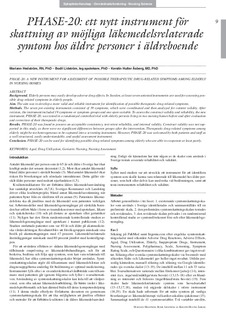PHASE-20: ett nytt instrument för skattning av möjliga läkemedelsrelaterade symtom hos äldre personer i äldreboende
Journal article

Åpne
Permanent lenke
http://hdl.handle.net/11250/2445213Utgivelsesdato
2009Metadata
Vis full innførselSamlinger
Originalversjon
Hedström, M., Lidström, B. & Åsberg, K.H. (2009) PHASE-20: ett nytt instrument för skattning av möjliga läkemedelsrelaterade symtom hos äldre personer i äldreboende. Vård i Norden : Nordic journal of nursing research, 29(4), s. 9-14. 10.1177/010740830902900403Sammendrag
Background. Elderly persons may easily develop adverse drug effects. In Sweden, at least seven untested instruments are used for assessing possible drug-related symptoms in elderly people.
Aim. The aim was to develop a more valid and reliable instrument for identification of possible therapeutic drug-related symptoms. Methods. The seven pre-existing instruments consisted of 39 symptoms, which were coordinated and then analyzed for content validity. After revision, the instrument included 19 symptoms or symptom-groups and one open variable. To assess the construct validity and reliability, the new instrument, PHASE-20, was tested in a randomized controlled trial with elderly persons living in two nursing homes before and after evaluation and correction of their therapeutic drugs. Results. PHASE-20 was found to possess an acceptable consistency, test-retest reliability, and internal validity. Construct validity was not supported in this study, as there were no significant differences between groups after the intervention. Therapeutic drug-related symptoms among elderly might be too heterogeneous to be captured into a screening instrument. However, PHASE-20 was welcomed by both patients and staff as a well structured, easily understandable, and useful assessment instrument. Conclusion. PHASE-20 can be used for identifying possible drug-related symptoms among elderly who are able to cooperate at least partly.
Beskrivelse
Beskriver utvikling og testing av et instrument for å avdekke og måle symptomer som kan være relatert til legemiddelbruk hos eldre.